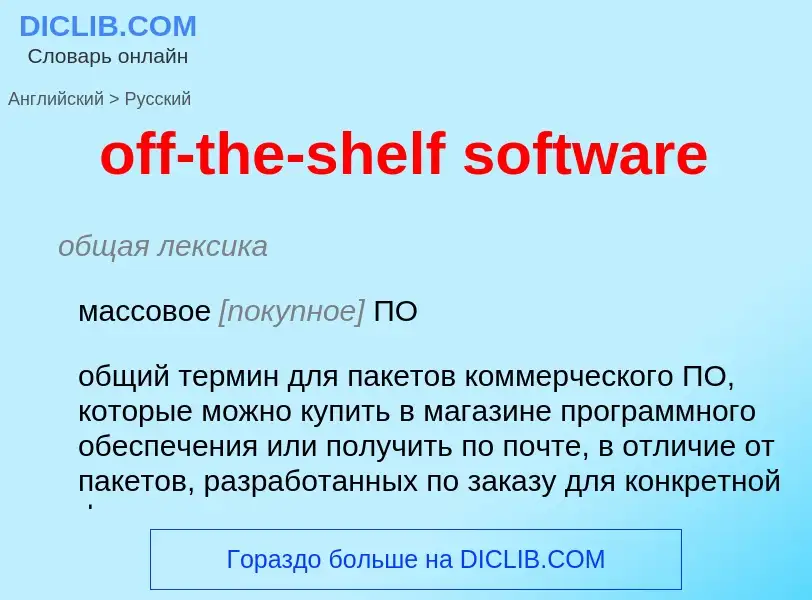Перевод и анализ слов искусственным интеллектом ChatGPT
На этой странице Вы можете получить подробный анализ слова или словосочетания, произведенный с помощью лучшей на сегодняшний день технологии искусственного интеллекта:
- как употребляется слово
- частота употребления
- используется оно чаще в устной или письменной речи
- варианты перевода слова
- примеры употребления (несколько фраз с переводом)
- этимология
off-the-shelf software - перевод на Английский
общая лексика
массовое [покупное] ПО
общий термин для пакетов коммерческого ПО, которые можно купить в магазине программного обеспечения или получить по почте, в отличие от пакетов, разработанных по заказу для конкретной фирмы или отрасли
Смотрите также
[ɔfðə'ʃelf]
общая лексика
готовое к использованию
относится как к ПО, так и к аппаратным средствам, off-the-shelf components - готовые компоненты
нефтегазовая промышленность
имеющийся в наличии
пригодный для использования
готовый к немедленному использованию
прилагательное
общая лексика
имеющийся в наличии
в продаже
стандартный (о запасных частях и т. п.)
пригодный к использованию
без (значительных) изменений (в технике, строительстве и т. п.)
готовый
Определение
Википедия
Commercial off-the-shelf or commercially available off-the-shelf (COTS) products are packaged or canned (ready-made) hardware or software, which are adapted aftermarket to the needs of the purchasing organization, rather than the commissioning of custom-made, or bespoke, solutions. A related term, Mil-COTS, refers to COTS products for use by the U.S. military.
In the context of the U.S. government, the Federal Acquisition Regulation (FAR) has defined "COTS" as a formal term for commercial items, including services, available in the commercial marketplace that can be bought and used under government contract. For example, Microsoft is a COTS software provider. Goods and construction materials may qualify as COTS but bulk cargo does not. Services associated with the commercial items may also qualify as COTS, including installation services, training services, and cloud services.
COTS purchases are alternatives to custom software or one-off developments – government-funded developments or otherwise.
Although COTS products can be used out of the box, in practice the COTS product must be configured to achieve the needs of the business and integrated to existing organizational systems. Extending the functionality of COTS products via custom development is also an option, however this decision should be carefully considered due to the long term support and maintenance implications. Such customized functionality is not supported by the COTS vendor, so brings its own sets of issues when upgrading the COTS product.
The use of COTS has been mandated across many government and business programs, as such products may offer significant savings in procurement, development, and maintenance.
Motivations for using COTS components include hopes for reduction system whole of life costs.
In the 1990s, many regarded COTS as extremely effective in reducing the time and cost of software development. COTS software came with many not-so-obvious tradeoffs— a reduction in initial cost and development time over an increase in software component-integration work, dependency on the vendor, security issues and incompatibilities from future changes.

